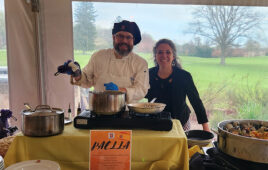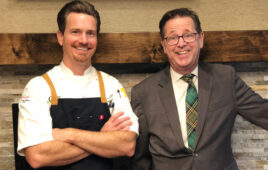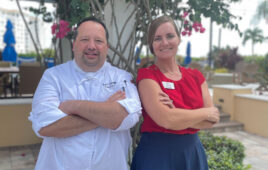
Adam Deviney, CEC (pictured second from the left), joined The Country Club of North Carolina as Executive Chef in August, where he and his team will expand and improve the food-and-beverage program.
When Michael Shannon, CEC, was named Executive Chef of Somerset Club in Boston, he was 26. He’d been sous chef at the club for five years, working and learning under Joseph Leonardi, CMC.
Somerset is a smaller city club that does about $1.5 million in annual F&B, focusing on fine dining. Shannon knew the culture and the team well. But after selecting Geoffrey Lanez, MBA, CEC, as his Sous Chef, Shannon would have to restaff nearly every position—a risk Leonardi warned him of before he left.
“I didn’t have any cachet as an Executive Chef yet, and it takes time to build that trust,” he says. “It was a tough year. But Leonardi was there for me throughout that process.”
In that first year, Shannon found he had much to learn still about management and leadership, starting with effective communication.
“As Executive Chef,” he says, “what you say and how you communicate is taken very seriously, so you need to take it very seriously, too.”
Making decisions as a leader requires trusting your training, he says, working on your communication and explaining your vision. It just takes time.
Six years into his role, Shannon cites humility among the most important characteristics of an Executive Chef. For him, this means “understanding that you’re never done learning, being grateful every day for your staff and giving recognition where it’s deserved.”
Adam Deviney, CEC, had been an Executive Chef for a decade, including several years in the club space, when he decided to accept an Executive Sous Chef position at The Club at Mediterra (Naples, Fla.). An invitation came via a mentor relationship with Carmen Mauceri, CCM, the club’s General Manager/Chief Operating Officer.
The move enabled Deviney to hone his skills and systems at a platinum-level food and beverage operation under Director of Culinary Operations Joachim Buchner, CMC, and to network with a talented group of chefs and leaders.
“The experience changed me as a chef,” says Deviney. “Watching [Mauceri’s] leadership style, I saw how much they invest in staff and culinarians. It’s a good example for me going forward.”
The move to Florida was never meant to be permanent, he says. And in August, Deviney accepted a position as Executive Chef of The Country Club of North Carolina in Pinehurst, N.C. It was the right fit for several reasons.
“The food-and-beverage volume ($2.4 million annually) interested me; I have more control over the food than I would in a larger club,” he says. “North Carolina is home to a lot of different farms, too. It’s a great opportunity to work with high-end, local products. And Pinehurst (N.C.) offers an excellent quality of life.”
With Deviney at the helm, the club expects to grow its food-and-beverage program, starting with a culinary garden and a dedicated a la carte sous chef.
Making an Impact
When Anthony Capua took over as Executive Chef of Sycamore Hills Golf Club in Fort Wayne, Ind., in 2020, he was ready to make waves as a leader and a culinarian of the club, which does about $2 million in annual F&B.

Anthony Capua, Executive Chef of Sycamore Hills GC (middle), considers the club’s GM/COO Christopher Hampton (left) and AGM Alfredo Hildebrandt (right) among his mentors.
“I’ve always wanted to change how clubs operate—to modernize for the next 50 years,” says Capua. “And I had a team here ready to make it happen.”
Still, he says that year one was challenging as a first-time Executive Chef at a new club (and in a pandemic).
“I was trying to balance my health, be a good husband and be a mentor,” he says. “I struggled in the first year. And I’m still learning every day.”
Throughout the process, he aims always to clearly communicate and demonstrate his values and expectations to staff.
“You have a responsibility to your team to ensure you’re setting the best example of what a good attitude looks like—even on an ‘off’ day,” Capua says. “It starts with the Executive Chef—from how you talk to a server to how you prep, clean, and talk with a member.”
Cooking is only part of the job, he adds. Particularly in the club space, with members, it’s about personal connection.
“I make the most impact being out there, with my team, with the membership, showing them that the days of chefs hiding behind closed doors are over,” he says. “I believe we can solve many of our problems by being in the front of the house, talking to our members.”
Capua aims to be known as a mentor and leader, and above all, as someone who takes care of his team—a mentality he associates with his military background.
When his Executive Sous Chef decided he wanted to move on from the club a few months ago, Capua said he’d help in any way he could.
“People did that for me,” he says, “and I always feel like it’s my duty as a culinarian and as a mentor to say, ‘If you’re ready, you’re ready.’”
Whether or not they’re lifetime culinarians, Deviney encourages staff at The Country Club of North Carolina to further their education.
“Becoming a Certified Executive Chef through the American Culinary Federation ignited a passion that wasn’t there throughout my career,” he says. “It’s opened many opportunities. It also helps with the discipline and the organization of becoming a chef.”
He aspires to guide his staff and touts the benefits of having mentors throughout a chef’s career.
“The mentorship aspect is different in our field,” says Somerset Club’s Shannon. “In many other industries, you work for a company, and in our field, you work for a chef. I was lucky because Chef Leonardi is extremely dedicated to his craft and cares about cooking and the membership. That passion gets you excited as a cook.”

In his first year as Executive Chef of Somerset Club, Michael Shannon, CEC (left), learned much about leadership and management.
As a culinary leader, Shannon encourages competition as a vital tool for his staff. He and Lanez (now Executive Chef at The Patterson Club in Fairfield, Conn.) will expand on the topic at Miami’s 2023 Chef to Chef Conference.
“Geo and I both come from competition,” says Shannon. “We realized how important it was for our development.”
To further motivate and train staff, he’s created an opt-in, professional growth plan to share their goals and select what they’d like to work on, such as technique or management skills.
“When they see growth, it’s inspiring,” he says. “It makes them want to keep improving.”




